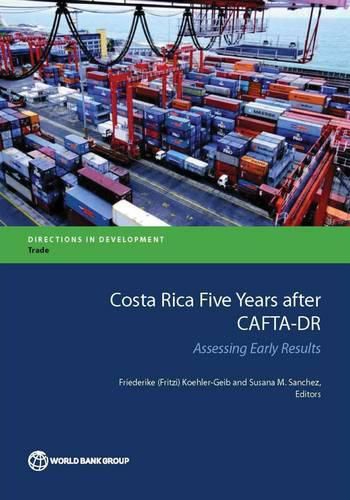Readings Newsletter
Become a Readings Member to make your shopping experience even easier.
Sign in or sign up for free!
You’re not far away from qualifying for FREE standard shipping within Australia
You’ve qualified for FREE standard shipping within Australia
The cart is loading…






For Costa Rica, the Dominican Republic-Central America-free trade agreement (CAFTA-DR) has been more than a trade agreement. Costa Rica has used trade liberalization and promotion of international trade as a core development strategy for decades. CAFTA-DR consolidated benefits that had previously been unilaterally extended under the Caribbean Basin Initiative (CBI) into a multilateral FTA, providing a much more stable environment for trade relationships. Beyond just being a trade agreement, CAFTA-DR brought about the opening of state monopolies in telecommunications and insurance, which polarized the country. No other trade agreement has generated as much controversy as this one about the potential impacts on the economy. Following a referendum with a small margin in favour of the agreement, Costa Rica was the last member country to ratify CAFTA-DR in 2009. Given the controversy at the time, the current study takes stock of the early impacts of CAFTA-DR during the five years since its ratification, addresses the following questions: What actual changes did the agreement bring about and what was their context? What was the impact of those changes on trade and FDI flows? How have the high tech, insurance, telecommunications, and pharmaceutical sectors been impacted?
$9.00 standard shipping within Australia
FREE standard shipping within Australia for orders over $100.00
Express & International shipping calculated at checkout
For Costa Rica, the Dominican Republic-Central America-free trade agreement (CAFTA-DR) has been more than a trade agreement. Costa Rica has used trade liberalization and promotion of international trade as a core development strategy for decades. CAFTA-DR consolidated benefits that had previously been unilaterally extended under the Caribbean Basin Initiative (CBI) into a multilateral FTA, providing a much more stable environment for trade relationships. Beyond just being a trade agreement, CAFTA-DR brought about the opening of state monopolies in telecommunications and insurance, which polarized the country. No other trade agreement has generated as much controversy as this one about the potential impacts on the economy. Following a referendum with a small margin in favour of the agreement, Costa Rica was the last member country to ratify CAFTA-DR in 2009. Given the controversy at the time, the current study takes stock of the early impacts of CAFTA-DR during the five years since its ratification, addresses the following questions: What actual changes did the agreement bring about and what was their context? What was the impact of those changes on trade and FDI flows? How have the high tech, insurance, telecommunications, and pharmaceutical sectors been impacted?